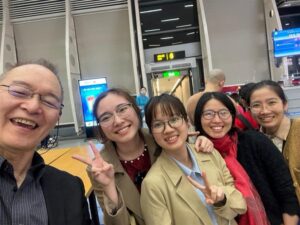At a certain point in one’s career, you notice suddenly that you’ve transitioned from the student to the teacher. It’s the natural order of things — to teach the next generations what we’ve learned from those who came before us and the discoveries we’ve made ourselves. In our field of research, we examine the past to guide present and future investigators to make their own discoveries, continuing the progression of our collective learning. I am fortunate to find myself in this next phase of my career.
It was impossible for me not to notice this generational progression occurring before my eyes when I recently attended a meeting of The Cervix Cancer Research Network (CCRN) in Vietnam. The CCRN is focused on improving cervical cancer outcomes worldwide by making cervical cancer clinical trials available in low-, middle-, and high-income countries. I was honored to be invited to speak at the CCRN meeting about the work IGCS is doing and to share my advice for the emerging investigators in this audience.
 Research and clinical trials were certainly the main topics of discussion among the young investigators attending the meeting. Here I am in a photograph with some of the young clinicians I encountered at the airport in DaNang. They were eager to tell me about the work that they are doing and wanting to hear my thoughts on how to formulate and advance their research.
Research and clinical trials were certainly the main topics of discussion among the young investigators attending the meeting. Here I am in a photograph with some of the young clinicians I encountered at the airport in DaNang. They were eager to tell me about the work that they are doing and wanting to hear my thoughts on how to formulate and advance their research.
My advice for young researchers is to focus on the basics — retrospective and observational studies are needed, regardless of if they practice in high-, middle-, or low-income parts of the world. This important experience will become a great first step to participate and generate your own prospective practice changing trials in the future.
I feel that IGCS and our members have the responsibility and capability to lend our support to our young colleagues through mentorship and educational programs. One example of IGCS working towards achieving this goal through the IGCS Early Career Research and Publications Network. This network organizes and provides research education to our young investigators and encourages regular communication among the network members. Just recently the network hosted a webinar to give tips on abstract writing for the IGCS Annual Meeting. A recording of this webinar and the previous early career workshops are hosted on the Education360 Learning Portal, free for IGCS Members.
Thank you to Rhonda Farrell, our board representative for this important program and all the junior mentors. The WhatsApp group has been an excellent way for them to communicate their needs and seek support for specific scenarios. I applaud these efforts and want to ask them to invest even more into determining how to best serve the network members, particularly to develop the system to support clinical research for investigators who do not have appropriate support logistics in their institutions.
I also challenge our members to consider becoming a mentor if they are able. Wherever you are in your career cycle, you may find yourself ready to give back. IGCS, being an international organization, has the potential to gather the collective learning established in the past and spread this knowledge worldwide. In many aspects, the different regions and resource settings of the world are in varying stages of development and learning. IGCS has no borders — we welcome everyone to join, to learn, and to collaborate.
I am honored to be serving as your President at this time in my career. I am incredibly grateful for the leaders that came before me, and I know this cycle will continue. Let's work hard to make the next generation of clinicians, researchers and leaders even more successful.
Time stops for no one, so we must not waste it. We must continue to prepare those who are just starting out in their careers — they are the future of this great Society. IGCS is a place where we “think big” and I thank you all for making IGCS what it is today.
From a life-long learner -- Sincerely,

Keiichi Fujiwara, MD, PhD
IGCS President


